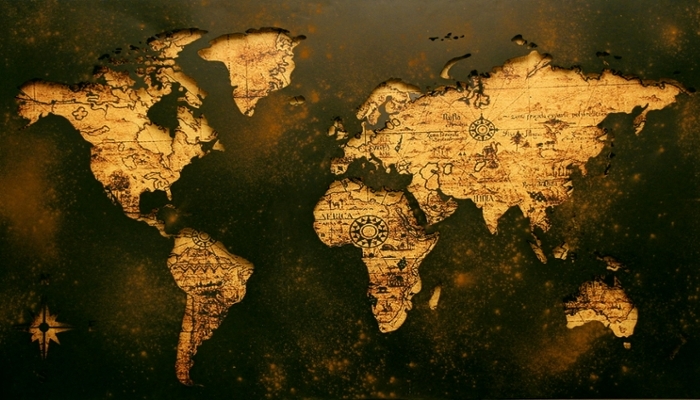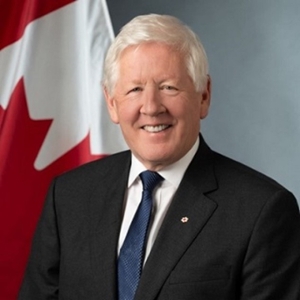
Foreign Policy in a Time of Turbulence
Our policies both foreign and domestic are indeed taking place in turbulent times. If there ever really was, there is certainly no real divide now possible between the policies that happen at home, and those that take place beyond our borders.
By Bob Rae, Canadian Ambassador to the United NationsIntroduction
Download the JSGS Policy Brief
Download the Discussion questions
Convincing the Canadian public, or any public for that matter, of that truth is a consistent duty of those elected to office today in our country. Many years ago, I asked my dad, who had spent his working career in the Canadian foreign service, why he had left his first job working for the Gallup organization in Princeton, New Jersey. He answered quite simply, “it was the time we were in, and I realized quickly that turning heads was more important than counting them.”
I spent much of my life in Canadian politics. But the more time I spend at it, whether federally or provincially, or whether in private life as a lawyer, mediator, or negotiator, I never felt that what happened in the world didn’t matter to us or didn’t directly impact what happened in our country.
An Interconnected World
The web of institutions, rules, values, relationships, economic ties, investment decisions, the ideas that matter, the cultural understandings, identities we share and so much else, all connect us to a world beyond our families, jobs, and borders. Those realities led us as a country into world wars in 1914, 1939, and into global conflicts from Korea onwards. There is no escaping the reality that the world is in us, and we are in the world.
We cannot escape our geography, our history, our trade and economic relationships, or the fact that the defence of democracy is what led us into war in 1939 and led us to commit to build and maintain a different world order in co-operation with the United States and other allies in 1945 and all the time since.
President Biden said recently that his first job as President is “to defend the principles, values, and institutions of democracy and open societies,” and to “strengthen the institutions, laws, and norms that sustain international co-operation to adapt them to meet the new challenges of the 21st century, and guard against those that would undermine them.”
In most settings these words would seem to be just more elaborate rhetoric. But the seriousness of the global challenges the world is facing, require us to understand that the “defence of Canada” is no small or narrow task.
It is a task that will require us to take our military obligations more seriously, at home, in the Arctic, and in the wider world. But it is wrong to think that the way to pay for these growing needs is to cut our assistance to expanding global prosperity by our commitments to trade, diplomacy and development.
There is no avoiding the reality that the world we are in now will cost us more, and that we should not be, and cannot be, a free rider under the American umbrella.
Without the leadership of the United States and the full participation of Canada and many other allies, the United Nations would not have been created. Nor would NATO, the General Agreement on Tariffs and Trade, or the other institutions that helped to underpin global change and economic growth since 1945. The strengthening of these institutions, and the creation of new ones, have been a critical part of global efforts of the past many decades.
Re-emergence of Dark Forces
Yet it is also important to recognize the role that the underlying forces of nationalism, exceptionalism, and isolationism also play in the dynamic of both American and global politics. They did not die in 1945, and they are very much alive today.
Franklin Roosevelt accomplished what Woodrow Wilson could not. While hailed as a modern saviour on his triumphal arrival in Paris to negotiate the Versailles Treaty and the formation of the League of Nations, Wilson was unable to fashion an enduring peace in 1919. Failing to create a coalition of support for his vision either in Paris or Washington, the Democratic Party was soundly defeated in 1920, and isolationism became the order of the day. Under the leadership of Robert Borden, Canada avoided this fatal temptation. We signed the Treaty of Versailles and we joined the League of Nations as a full member.
Europe and the wider world entered what has rightly been called the “dark valley” of the 1920’s and 30’s, and there was no capacity in any capitals, or in any international institutions, to stop the rise of fascism, the ravages of the Depression, or the return of international aggression.
The forces that created that chaos have never been fully vanquished, and they are ever present today.
Russia’s aggression in Ukraine is just one example of a country immersed in imperialist fantasies ignoring every principle of international law, seeking to impose its desires and will on the world with reckless disregard for the consequences. It is not a conflict to which we can be indifferent, or which can be ended with a “truce” that is a short respite to the aggressor, a kind of break between meals. Pretending that an easy solution can be found is a terrible mistake. It will require co-operation and a willingness to spend resources on a scale NATO and its members have not seen since the end of the Cold War.
The alternative would be a setback to all of our efforts to defend democracy under attack, and a defeat for the values and interests we stand for.
In the Middle East, we have seen the loss of hundreds of thousands of lives, and the creation of complete disruption in the lives tens of millions more, in a series of conflicts that have been unabated and unresolved since 1945. The latest crisis, the war between Israel and Hamas, has led to many civilian deaths and the total destruction of Gaza, home to over two million people. The crisis has spread and intensified into a regional conflict between Israel and Iran’s proxy Hezbollah in Lebanon, with Iran in turn attacking Israel. The illusion that military dominance alone can create deep security runs deep. So do hate, xenophobia, and refusal to see the recognition of the dignity of the other as the foundation of both peace and security.
Not All Politics is Local
Citizens and leaders of countries around the world see their realities through a personal lens, reflecting the adage that “all politics is local”. The problem is that not all problems or realities are local. Many are global, and their consequences are not limited to one country or region.
The pandemic played out in our media as if it was simply a local or national event. But the virus by definition knows no borders or boundaries. It spreads despite best efforts to isolate. In that sense it is truly a metaphor of our time. The expression “we’re all in the same boat” belied the more difficult reality that while the storm may be global, we live in very different boats and depending on the boat we’re in we’re either going to do all right or face personal tragedy. The countries that fared the worst in the pandemic were the poorest, with few vaccines available, and little resilience in either economies or health care systems. Resentment at these inequalities grows and are exploited by those seeking to undermine global institutions.
What is true of the pandemic is true with climate change, with global migration, and with the economic consequences of how we collectively respond to the cascading crises that now have us surrounded. The populist, isolationist rhetoric is the same - as if there could possibly be an effective response to planetary self-destruction that was less than global.
Disengagement and retreat are, like appeasement in the 1930’s, based on the false notion that the abandoned world will be a safe one. Not at all. Politics, like nature itself, abhors a vacuum. Others with even worse motives will fill the void. Smelling disinterest and weakness, they will seize the spoils of chaos for themselves.
Russia may not be a great economic power. But it is a nuclear and military power, and like the Soviet Union sees the world as a critical theatre for its influence to be played out. We see this at the United Nations every day. Russia strives to build an authoritarian, patriarchal global alliance that is every bit as pernicious as the Communist International that fought the challenge of democratic ideas and capitalist economic structures with such grim determination and brutal repression in the years between 1917 and 1990.
Imperial ideas die hard, and they morph into different forms. Chinese self-confidence, which was devastated by foreign occupation and bitter internal divisions, began its real restoration in 1949. The key leader in the transformation of Chinese society and economy began not with Mao, but rather with Deng Shao Ping in 1980. Unleashing the Chinese economy with a capitalist revolution in agriculture, followed quickly by every sector across the country, China’s power is far more deeply rooted and consequential than Russia’s. Its economic and technological rivalry with the United States and Europe is growing, and now stretches around the globe. Its approach is more well planned and strategic than anything democratic societies have faced in a generation.
The premise, and the promise, of the UN Charter is that nation states will come together to provide for collective peace and security, development, and the rule of law. The elements of the “nexus” have been built in an array of institutions based around the world that are attempting to work together in a common cause.
The governance of these institutions is deeply flawed, but such is the way of the world. The five victorious powers after World War II insisted that they be given a veto in the Security Council, the global body responsible for peace and security. When that veto was linked to nuclear weaponry, it transformed all thinking about how to achieve security, as power alliances grew to ensure that a UN logjam would not prevent effective self-defence. But as a result, the UN itself does not get the resources it needs to be able to address the critical issues it is facing in attempting to deal with the outbreak of conflict in every region and continent in the world. Haiti, the Sahel, Sudan, Myanmar, and the Middle East are critical examples where the problem is not at all “too much UN”. It is “too little UN”.
Similarly, the determination by the United States to ensure that it maintain effective control of both the World Bank and the International Monetary Fund, now means that it is challenging to accommodate new economies, and new economic powers, into the global governance structure. But this is what must happen. If institutions fail to reform to respond to the demand for change, then those locked out will set up alternatives.
This is already happening. The G7 was eventually followed by the G20, and now the BRICS (Brazil, Russia, India, China, South Africa) which this year expanded to four more countries have emerged as an alternative center of power and influence. But sensible voices have rightly observed that new ways of co-operating and collaborating are in fact essential.
We must do more than just watch and worry. We can bring certain critical ideas to bear and do what we can to make our friends aware of the deep interconnectedness of the modern world. Above all our influence depends on our willingness to bring new resources to the table. No one can stop the world and try to get off.
That was never possible, and it is certainly not possible now.
Isolationism Has Consequences
No matter how exceptional some countries feel they are, it is important to remind everyone that isolationism has its consequences, as does the increasingly unrealistic and offensive idea that some countries have a sacred mission that makes them better than everyone else.
The rule of law, for example, allows for no exceptions, either at home or abroad. Most countries accept the principle that the rules apply to them, that they are not above them, and that breaking them will bring consequences. We do so not because we are more moral than anyone else, but because we know that this idea is the only one that will protect our interests, and allow us to thrive peacefully in the world.
Countries with seemingly insurmountable power have to learn the lesson that change happens. Empires wither. Such is the way of the world. Our response to all this has to be a deeper commitment to our ideas and ideals, that has to be more than just well-meaning or rhetorical. Our walk and our talk have to match up. Our influence will depend on our willingness to commit resources to a global challenge that is at once daunting but unavoidable. We are not alone, and we are not powerless.
Bob Rae

Bob Rae is the Ambassador and Permanent Representative of Canada to the United Nations in New York. He has served in this post since August 4, 2020. Since assuming this role has been active in all aspects of the work of the UN, culminating in his election to the Presidency of the Economic and Social Council (ECOSOC) for 2024‑25, the second Canadian to assume this role, and joins Lester Pearson (President of the General Assembly 1952‑53) and George Davidson (ECOSOC 1958‑59) as Canadians elected in their personal capacity to preside over UN Charter bodies.
Mr. Rae served as Premier of Ontario from 1990 to 1995, and interim Leader of the Liberal Party of Canada from 2011 to 2013. He was elected to federal and provincial parliaments eleven times between 1978 and 2013. He has been honoured by the alumni of both bodies for his distinguished service.
Mr. Rae received his Honours B.A. in Modern History from the University of Toronto, an M.Phil in Politics as a Rhodes Scholar at Balliol College in Oxford University, and graduated from the University of Toronto Faculty of Law in 1977. He was a Lecturer in the Faculty of Business (1976‑77) and also served as assistant to the Canadian General Counsel of the United Steelworkers from 1975 to 1977. He was called to the Bar of Ontario in February in 1980 and was named a Queen’s Counsel in 1984.


